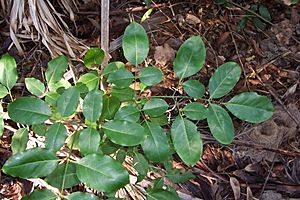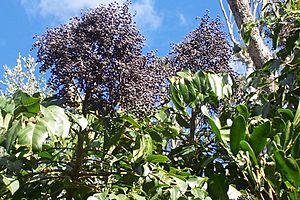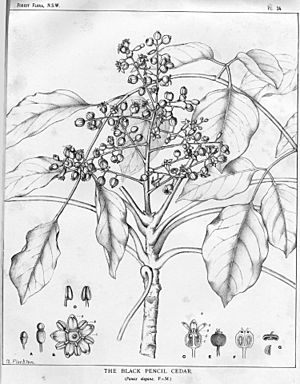Polyscias elegans facts for kids
Quick facts for kids Polyscias elegans |
|
|---|---|
 |
|
| Polyscias elegans at Wyrrabalong National Park, Australia | |
| Scientific classification |
|
| Kingdom: | Plantae |
| Clade: | Tracheophytes |
| Clade: | Angiosperms |
| Clade: | Eudicots |
| Clade: | Asterids |
| Order: | Apiales |
| Family: | Araliaceae |
| Genus: | Polyscias |
| Species: |
P. elegans
|
| Binomial name | |
| Polyscias elegans (C.Moore & F.Muell.) Harms
|
|
| Script error: The function "autoWithCaption" does not exist. | |
| Synonyms | |
|
|
Script error: No such module "Check for conflicting parameters".
The Celery Wood (scientific name: Polyscias elegans) is a cool rainforest tree found in eastern Australia. It grows in many different kinds of rainforests. You can find it from Jervis Bay in southern New South Wales all the way up to Thursday Island in northern Australia. People also call it the black pencil cedar or silver basswood. This tree is super helpful! It acts like a "nursery tree," giving shade to younger, slower-growing trees.
Contents
What the Celery Wood Looks Like
The Celery Wood is a fast-growing tree. It can reach up to 30 meters (about 98 feet) tall. Its trunk can be as wide as 75 centimeters (about 30 inches). Young trees have smooth bark. Older, larger trees have rough, scaly bark.
The leaves are big and look a bit like palm fronds. They are made up of smaller leaflets. These leaflets are usually oval-shaped with a pointed tip. Each leaflet is about 5 to 13 centimeters long. You can easily see the veins on both sides of the leaflets.
Flowers and Fruit
The Celery Wood produces purple flowers. These flowers grow in large bunches at the end of the branches. They usually appear between February and April. Sometimes, they can bloom at other times of the year too.
After the flowers, small fruits grow. These fruits are called drupes. They are brown or purplish-black and about 5 to 7 millimeters wide. Inside each fruit are two tiny seeds. These seeds are very important for new trees to grow. Birds like the pied currawong eat the fruit. When they drop the seeds, new Celery Wood trees can start to grow.
Animals That Eat Celery Wood Fruit
Many different birds love to eat the fruit of the Celery Wood tree. This helps spread the seeds to new places. Some of these birds include:
- Brown cuckoo-dove
- Australasian figbird
- Green catbird
- Lewin's honeyeater
- Olive-backed oriole
- Pied currawong
- Paradise riflebird
- Rose-crowned fruit dove
- Silvereye
- Superb fruit dove
- Topknot pigeon
- Wompoo fruit dove
See also
 In Spanish: Palo apio para niños
In Spanish: Palo apio para niños
 | Bayard Rustin |
 | Jeannette Carter |
 | Jeremiah A. Brown |



